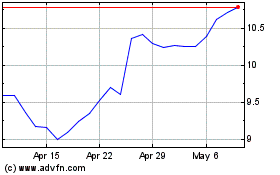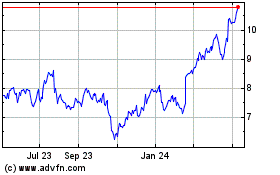Brexit Throws U.K. Banks' Strategy Into Turmoil
June 29 2016 - 10:43AM
Dow Jones News
By Max Colchester
LONDON--Barclays PLC executives spent a couple of days holed up
in a "situation room" ahead of last week's Brexit vote to ensure
the bank could handle anything from panicked customers to wild
algorithmic trading.
When they came up for air, investors raised a different concern:
does Barclays need to rethink its strategy?
British banks, packed with huge stocks of cash, rode out the
wild market swings in the immediate aftermath of Brexit. But now
analysts are concerned about how they will deal with the
longer-term problems: namely, an economic slowdown, a potential cut
in interest rates and a fall in U.K. house prices.
Moody's Investor s Service Tuesday night changed its outlook on
the U.K. banking system from "stable" to "negative." And on
Wednesday Bernstein Research said that the huge uncertainty made
several lenders "almost uninvestible." Already pressure is rising
on executive teams to accelerate cost-cutting plans and investors
are bracing for dividend cuts.
Bankers aren't the only ones flummoxed. Investors, who before
the vote were scrutinizing the minutiae of bank regulatory rule
changes, are now trying to predict how British politicians will
handle negotiations with the European Union. "It's outside of most
people's comfort zone," said Thomas Moore, investment director at
Standard Life Investments.
Barclays, which has seen its share price slump 30% since last
Thursday, finds itself in the eye of the storm. Following his
arrival last year, Chief Executive Jes Staley pledged Barclays
would remain diversified with a sizable investment bank and that
his team could boil down a mountain of unwanted assets by 2017.
Analysts say that the uncertainty around Brexit could hamper the
bank's plan to cut costs as it may have to relocate certain
investment banking operations outside the U.K. It could also dull
investor appetite for some unwanted assets. "It puts a spanner in
the works," says Joseph Dickerson, a banks analyst at Jeffries.
Barclays currently has no plan to alter its strategy, according
to one senior executive. Around 60% of Barclays' investment banking
revenue comes from the U.S., and a fall in sterling makes dollar
generated revenues more valuable. So far, volumes in foreign
currency trading have managed to offset falls in other products
across Europe and plans to sell down its "noncore" unit are on
track, the executive added.
Instead, the pain will likely be felt in its more vanilla
businesses. Barclays' credit cards unit, which is the bank's profit
engine, could be hit if people cut spending amid a slowdown. The
bank is also exposed to corporate lending in the U.K. which could
see a pickup in bad loans if investment slows.
The picture isn't much brighter for other British banks. Royal
Bank of Scotland Group PLC was struggling to make profits even
before Brexit happened. The 73% state-owned lender is still
spending billions restructuring following a bailout in 2008. And to
make matters worse it will likely be hit by a multibillion fine
from U.S. regulators for having sold on toxic subprime mortgages
during the crisis.
Against that backdrop, Brexit doesn't make life easier. Scotland
may again push for independence, raising the question of where the
Edinburgh based bank will be located. Moving its headquarters alone
could cost around GBP1 billion, according to analysts at Jeffries.
The government's plans to privatize the bank have been scrapped for
now, according to one person familiar with the matter. Analysts
expect the bank to accelerate cost reductions later this year.
Lloyds Banking Group PLC, the poster child of postcrisis
restructuring, made a point of ditching its global operations to
focus on the U.K. Today 95% of its exposure is to the British
economy, according to Bernstein Research. Even before the vote, it
was speeding up its cost cuts. On Wednesday it announced 525 job
cuts.
HSBC Holdings PLC, with roughly two-thirds of its $1.1 trillion
risk-adjusted assets outside of the U.K. and Europe, has fared the
best so far with stock investors. Its shares Wednesday traded
around the same price as before the vote. But analysts caution that
the bank, one of the world's largest, still faces pressures in its
U.K. mortgage and unsecured lending. Flush with customer deposits
in the U.K. and Asia, HSBC is also set to feel the ongoing drag
from low interest rates cutting into its net interest margin, or
the difference between what it pays to borrow and what it charges
to lend.
U.K. lending has been keenly priced, and HSBC just days before
the referendum started offering U.K. home buyers the lowest rate
ever from a major lender, at 0.99%. Some analysts say it's
inevitable HSBC will have to hold or even cut its dividend.
Margot Patrick contributed to this article
Write to Max Colchester at max.colchester@wsj.com
(END) Dow Jones Newswires
June 29, 2016 10:28 ET (14:28 GMT)
Copyright (c) 2016 Dow Jones & Company, Inc.
Barclays (NYSE:BCS)
Historical Stock Chart
From Mar 2024 to Apr 2024

Barclays (NYSE:BCS)
Historical Stock Chart
From Apr 2023 to Apr 2024
